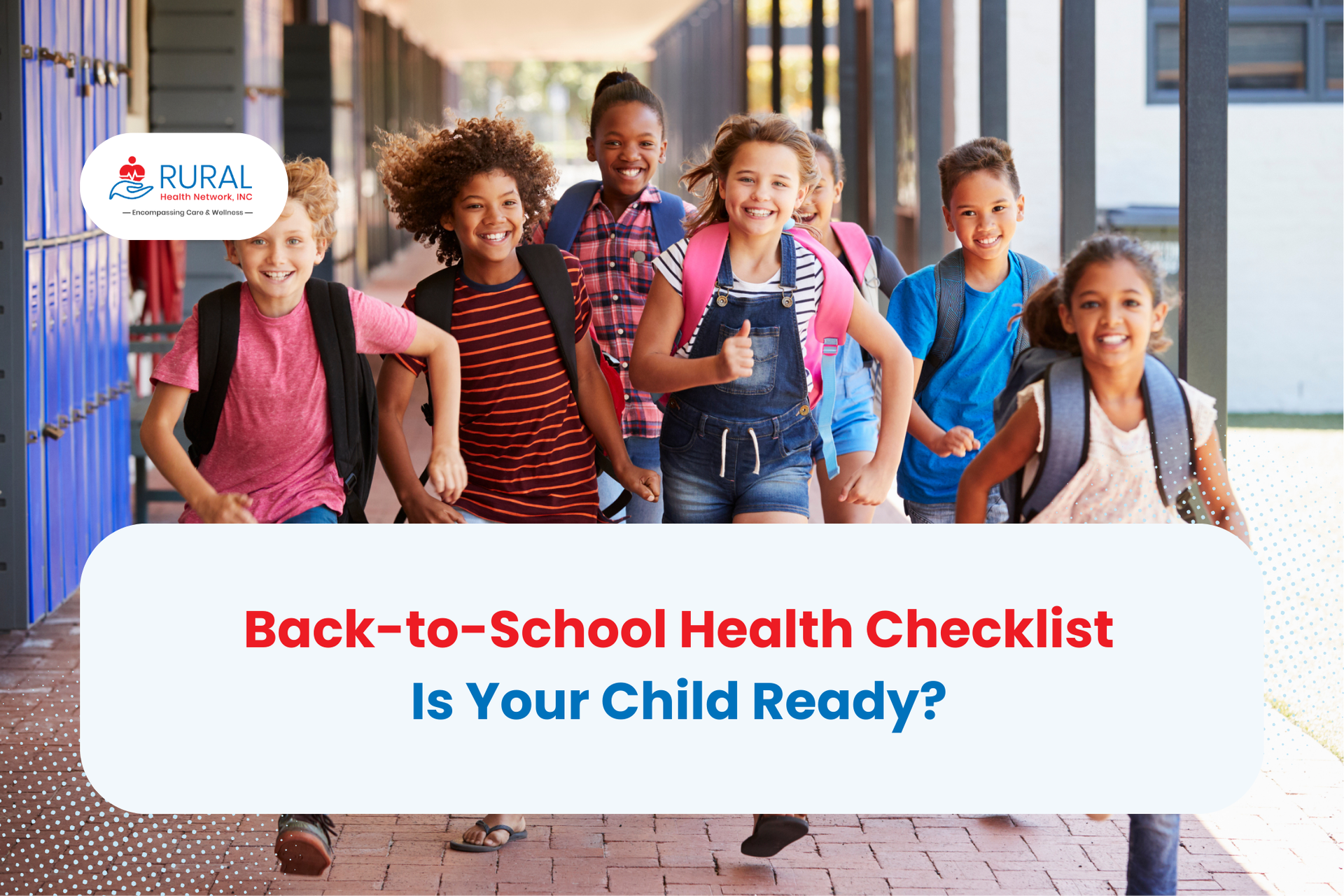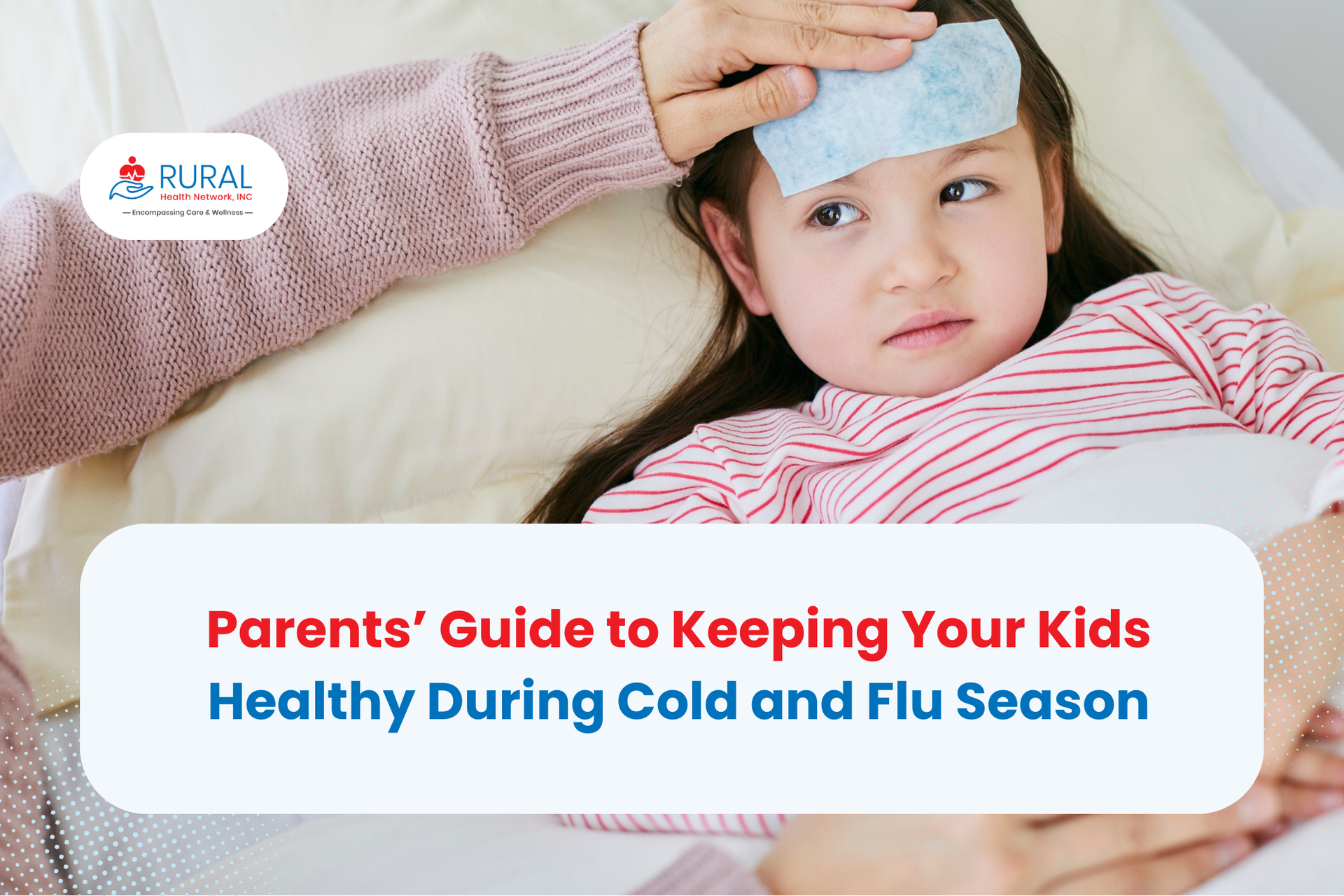Back-to-school season is here! It’s an exciting time filled with new classes, fresh notebooks, and unforgettable childhood memories.
But while you’re checking off school supply lists, it’s just as important to make sure your child’s overall health is ready for the year ahead. After all, a healthy child is a happy learner, prepared to tackle new challenges, make friends, and thrive in the classroom.
At Rural Health Network, we’re here to help with
comprehensive health assessments and screenings. Consider it the final check on your back-to-school list, so your child can start the season with a healthy body, a happy smile, and the confidence to succeed.
Make This School Year Their Strongest Yet
It’s easy to forget what’s on your family’s health checklist after a long summer break. If you’re wondering how to get started on your child’s back-to-school preparations, here’s a helpful refresher to guide you.
Annual Wellness Check
Your child’s performance at school is only as good as their overall health and well-being. If you want your child to excel this academic year, a checkup ensures that they’re in the best shape to do so. Here’s what most
wellness checks cover:
- Growth & Development Tracking: Your child’s pediatrician checks height, weight, and vitals to make sure your child is growing as expected.
- Preventive Care: These visits help catch potential issues early before they become bigger challenges.
- Milestone Check: Doctors review developmental milestones, making sure your child’s physical, emotional, and social skills are on track.
- Scheduled Immunizations: Your child’s school requirements likely include updated vaccination records. Your provider will help confirm whether your child’s vaccinations are up to date.
Vision & Hearing Screenings
Subtle vision or hearing issues can often go unnoticed. When children exhibit symptoms, they often get misconstrued as “behavior” or “learning struggles” in the classroom. Here are signs parents should pay attention to:
- Sitting too close to the TV or holding books right up to their face
- Squinting at the board or screens
- Frequent headaches or eye rubbing
- Trouble following instructions in class
If these signs appear, you should see a pediatrician for:
- Annual Screenings: Schedule a yearly check to catch problems early.
- Vision Check: Helps spot if glasses or other support are needed.
- Hearing Check: Ensures your child isn’t missing key classroom instructions.
Dental Health
Did you know that
82% of children miss school because of dental issues? Dental pain is a major distraction in the classroom. To ensure oral health, keep up with:
- Dental Checkups: Schedule routine visits (ideally twice a year) to spot cavities early and keep teeth strong.
- Fluoride Treatments: A simple, safe way to protect against decay.
- Daily Habits: Encourage brushing twice a day and flossing once a day.
- Smart Snacks: Limit sugary treats and choose fruits, veggies, or cheese for healthier options.
Nutrition & Healthy Eating Habits
Strong teeth deserve healthy fuel to match! What kids eat during the day directly affects their focus, mood, and energy in the classroom. Here’s your quick nutrition checklist:
- Pack Balanced Lunches: Aim for a mix of protein, whole grains, fruits, and veggies. Try out the USDA’s free tool,
MyPlate plan, to help you figure out the right portion sizes for your child.
- Choose Water First: Encourage water bottles over juice boxes or soda. Proper hydration boosts focus.
- Avoid Skipping Breakfast: A simple breakfast can set your child up for a focused, energetic day.
Sleep & Daily Routines
Sleep recharges the brain. When kids lack rest, even with balanced meals, they can struggle with focus, behavior, and energy. Make sure to:
- Know Your Hours: For kids aged 6 to 13, aim for 9–12 hours of sleep. If your child is 14 to 17 years old, 8–10 hours is recommended.
- Stick to a Routine: Sleeping and waking up at a consistent time helps regulate your child’s internal clock and makes mornings less challenging.
- Ease Back Gradually: Start shifting bedtime 15–30 minutes earlier each night, a week or two before school starts.
- Create a Wind-Down Zone: No screens an hour before bed. Try reading, listening to soft music, or doing quiet activities instead.
Mental & Emotional Readiness
Kids may feel anxious about new teachers, classmates, or routines, and that’s completely normal! Build up their confidence and ease their worries with a bit of preparation at home. Here’s a quick checklist:
- Check In Regularly: Ask how your child is feeling about going back; sometimes just listening eases their worries.
- Practice Routines Together: Walk through the first day, from packing the backpack to drop-off, so it feels familiar.
- Promote Positivity: Celebrate small wins, encourage a growth mindset, and remind them it’s okay to make mistakes.
- Watch for Warning Signs: Trouble sleeping, clinginess, or withdrawal could mean your child needs extra support.
Physical Activity & Screen Time Balance
Strong minds need strong bodies, too. Regular movement keeps kids healthier, improves focus, and even boosts their mood. Practice these habits:
- Aim for Daily Activity: Kids need at least 60 minutes of physical play or exercise each day.
- Encourage Active Play: After school, swap out extra screen time for biking, sports, or even a simple game of tag.
- Set Screen Limits: Keep recreational screen time to 1–2 hours a day max.
- Lead by Example: Kids follow what they see, so join walks, backyard games, or family dance breaks.
Backpack & Posture Safety
Even something as simple as carrying a backpack every day can impact posture and comfort. An overly heavy or poorly worn backpack can strain their little shoulders and backs. Here are some backpack basics:
- Keep It Light: A backpack should weigh no more than 10–15% of your child’s body weight.
- Two Straps, Always: Wearing both straps distributes weight evenly and prevents slouching.
- Adjust the Fit: The bag should sit snugly against the back, not sag below the waist.
- Pack Smart and Check Regularly: Heavier items (like books) go closest to the spine; lighter items can sit up front. Remember to peek inside once in a while; sometimes kids carry way more than they need.
Allergy & Medication Readiness
For children with asthma, allergies, or other medical conditions, preparation is key to keeping them safe and confident during the school day. Follow these steps to stay prepared:
- Double-Check Prescriptions: Make sure inhalers, EpiPens, or other medications are up to date and not expired.
- Pack Smart: Keep medications in a labeled, easy-to-reach pouch or provide a set directly to the school nurse.
- Share the Action Plan: Give teachers, coaches, and the nurse a copy of your child’s allergy/asthma action plan with clear instructions.
- Update Emergency Contacts: Ensure the school has current numbers for parents/guardians and backup contacts.
- Teach Your Child: Even younger kids should know the basics, like what they’re allergic to and when to ask for help.
Your Child’s Healthiest School Year Starts with Rural Health Network
You now have a comprehensive cheat sheet for getting your child ready for their best school year yet!
We understand that preparing for the school year can be a big responsibility. We have your back!
Rural Health Network is here to support you in keeping your child healthy, happy, and ready to learn. Our team can:
- Assess your child’s health before the school year kicks off.
- Provide guidance on nutrition, allergies, and safe habits.
- Reassure you with practical advice if you have any concerns.
Schedule your child’s back-to-school health check with us today so they start the school year strong, confident, and healthy.
Keep Your Child Safe, Healthy, and Ready to Learn
Frequently Asked Questions
What if my child seems healthy? Do they still need a back-to-school checkup?
Yes! Even if your child feels fine, yearly checkups can catch issues early, update vaccines, and give you peace of mind that they’re school-ready.
How far in advance should I schedule my child’s appointment for a school physical?
Ideally, book 4–6 weeks before school starts. This gives time for any follow-up tests, forms, or vaccinations your child may need.
What if my child needs a special care plan at school (like for diabetes or ADHD)?
Bring your child’s action plan and medication list to their checkup. Our team can help update instructions and coordinate with school staff if needed.
Do I need to bring anything to the appointment?
Bring your child’s immunization records, list of medications (if any), and school forms that need a provider’s signature.













